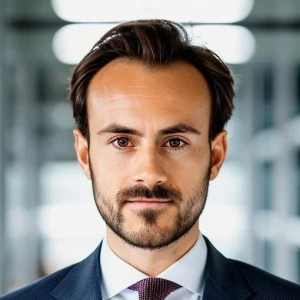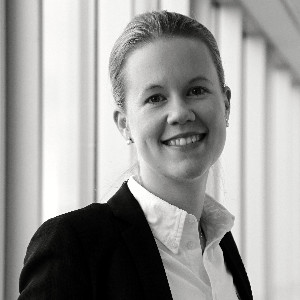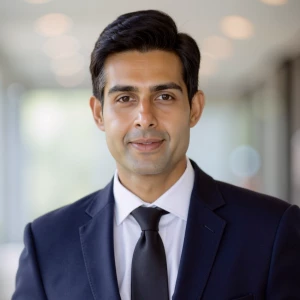Hello all,
I have a question regarding what insightful questions to ask the interviewer at the end of an interview that make you stand out?
Thank you.
Hello all,
I have a question regarding what insightful questions to ask the interviewer at the end of an interview that make you stand out?
Thank you.


Hi Anonymous,
This is the moment where you can confirm the good fit you had with the interviewer during the 1h itw.
I personnally suggest to avoid every question that can be asnwered by the firm's website, as well as other question related to firm that could be answered by a consultant you could contact from the outside (alumni from your school, personal network etc.)
Instead I will take this opportunity to really create a connexion with the interviewer as a person, and ask question about his own experience that can somehow relate to your own projection in the job. Therefore I would advise to
- Listen carefully the introduction of the interviewer : his profile, experience prior to consulting, and as a consultant. This will help for you to think about questions. You can even write down the question you have at this time for the end of the itw
- Ask questions related to his experience and personal appreciation / decision making : ex. if he joined consulting as experienced hire, ask about his previous job, the reason to move to consulting, and ultimately how he feels now in consulting compared to what he expected
- Ask questions about his consulting experience, especially if they are related to industries / topic that make sense for you : ex. more details about a job he has done in as FMCG industry if this make sense to you, and since this is an industry you are really interested in how strong is the firm in that industry and what are the perspectives at the moment for future business there / who is the partner, etc.
Hope this helps
Benjamin

Hi Anonymous!
There is a whole lot of great questions you can ask. My best advice is to really think through what interests you most about the job, the firm, or the industry! If you have a particular interest (industry sector, nonprofit area, social engagement, etc.) you can ask if there are touch points/adjacent areas in the firm you could explore. Also, make sure to relate your interests and questions to your background and/or career/life objectives.
Another good domain to explore is the background and interest of the interviewer: for example, one of my first round interviewers at BCG had listed playing music in a band as one of his hobbies, and since I had been a band musician myself for 10 years, this was a great topic to discuss against the backdrop of his consulting career.
All of that being said, here are a couple of example questions – but by no means exhaustive:
Cheers, Sidi

Ask about them
People love to talk about themselves. Just ask them what they've worked on recently or what their journey at BCG has been like. Importantly, do your research beforehand - find out what they've done and try and pick something from their past that looks interesting to you. Tailor your questions just like they tailor their FIT questions to your resume."So, how did you end up in the Industrial Goods sector?"
Ask insightful questions
Ideally, your questions should also show them that you're insightful, inquisitive, bright, thinking about current topics, etc. For example:
"I saw you worked on a big digital transformation for a financial services company - I experienced one myself and it seemed so hard to move such a big organisation. What did you see as the major challenges and breakthrough moments?"
"I know that x big trend is happening. I also know that y types of companies exhibit z traits. How do you reconcile this difference when ensuring y companies adopt x trends?
Summary: Ask about THEM and ask insightful questions!

Hi,
The main objective is to have a good conversation and highlight your intellectual capacity and curiosity. Thus:
It is ok to ask:
It's not ok to ask:
Be prepared and good luck!

Ask about them
People love to talk about themselves. Just ask them what they've worked on recently or what their journey at BCG has been like. Importantly, do your research beforehand - find out what they've done and try and pick something from their past that looks interesting to you. Tailor your questions just like they tailor their FIT questions to your resume."So, how did you end up in the Industrial Goods sector?"
Ask insightful questions
Ideally, your questions should also show them that you're insightful, inquisitive, bright, thinking about current topics, etc. For example:
"I saw you worked on a big digital transformation for a financial services company - I experienced one myself and it seemed so hard to move such a big organisation. What did you see as the major challenges and breakthrough moments?"
"I know that x big trend is happening. I also know that y types of companies exhibit z traits. How do you reconcile this difference when ensuring y companies adopt x trends?
Summary: Ask about THEM and ask insightful questions!

HI,
In most of the cases, you'll have no chance to research in profile. From what I've seen only Bain shares interviewers names.
The main objective is to have a good conversation and highlight your intellectual capacity and curiosity. Thus:
It is ok to ask:
It's not ok to ask:
Be prepared and good luck!

Hi,
The main objective is to have a good conversation and highlight your intellectual capacity and curiosity. So it's not the best idea to ask for the feedback. Here are some guidelines:
It is ok to ask:
It's not ok to ask:
Be prepared and good luck!

Here are some ideas for you, but honestly interviewers are humans, so I always loved the most candidates who asked me fun questions ;-)
About the Team:
Company Culture:
Performance Expectations:
Professional Development:
Project Variety:
Challenges and Opportunities:
Feedback Process:

Hi Anonymous,
the last part of the interview is often used by interviewers to confirm the impression they got over the first part of the interview, which means:
Situation A: They trust in your abilities and are likely to vote for you during the discussion round following the round of interviews - they expect you to show genuine interest in what the firm and its consultants do in order to figure out whether this particular consultancy is the right place for you
Situation B: They do not trust in your abilities and are likely to vote against you during the subsequent discussion round - they expect you to ask some general questions, but will be positively surprised if this last part of the interview turns out to be more interesting than expected and that may even change their overall impression
What does this mean for you?
The key to any job interview is to be prepared - that includes not only cases and the personal fit part, but also the final Q&A part.
Good luck!

Hi there,
good questions at the end should include the following:
In the first reply in the following thread, you can find some more information and some examples of questions:
https://www.preplounge.com/en/consulting-forum/open-house-at-bcg-311
Best,
Francesco

A few options could be:

Lots of great answers below.
The best questions are the ones that string from the discussion that you've been having with them throughout the interview. That of course depends on your skills as an active listener.
The next best thing that you can do is to ask them about their own experience of being the firm and the advice they could provide you with.
So something along the lines of ‘what would you advise somebody like me who is at the start of the career to focus on in order to have a good life in the firm?’
Best,
Cristian
Hey Andrés,
You don't find much information on how to structure the final questions to ask to the interviewer... because there's not supposed to be one at all.
Candidates are increasingly trying to approach that final part of the interview as an alternative opportunity to impress or ask very smart questions, but most of the consulting firms are clear on what they want with it: give an opportunity to candidates to ask about whatsoever is really important for them! So, the best questions are the ones about what you are really curious and interested to know and that you can't easily find online (through a 2min google search).
Best
Bruno

A question I find interesting for people who stayed in same firm for more than 5 years is asking for what is making them stick around. Both in the industry, since it can be grueling in the long term with all the travel, but also in the specific company. Another question I think you can get a great perspective on is what characteristics they see in consultants (first level post-MBA) that stick around long term. Finally all questions about industry evolution (strategy shop expanding their solutions offerings, etc) are great.
In general this is the moment to ask things you are curious about but that are not “dangerous” - in the sense that they uncover unpleasant answers and might make question the partner on whether you did the proper due diligence about the job. This because at this point in time (well actually always) partners objective is to sell you on the job if they think you are a great addition to the company.
hope this helps,
andrea
Hi there,
I will firstly caveat that in my experience the final part of the interview has never been a "make it or break it" scenario, and in 99% of cases by that point the interviewer will have already decided if he will pass you or not. However, the final questions can still be an important part of the interview. In my view there's two types of questions you should be asking:
1) Genuine information about the firm you could not find online: you should really take this as an opportunity to ask questions that you genuinely want to know the answer to. However, you shouldn't ask questions that can easily be answered with a google search, as this will make you seem unprepared/not that committed to the firm.
2) Personal questions about the interviewer: Chances are, the interviewer will have either introduced himself and given a short bio at the start of the interview, or you will have a received an interviewer bio before the interviewer. You should tailor your questions to them, and their experience.
Did they do a 6 month transfer to an office in Asia? Ask them about it and how the two offices differed. Was he/she a lawyer before doing an MBA? Ask about it and what made them switch to consulting.
People will much prefer talking about themselves than generic facts about the firm they work for. You are also much more likely to build a rapport with the interviewer this way - therefore, he is more likely to remember you and vouch for you if needed during the recruiting (of potentially, even when you join the firm).

Hi Anonymous!
There is a whole lot of great questions you can ask. My best advice is to really think through what interests you most about the job, the firm, or the industry! If you have a particular interest (industry sector, nonprofit area, social engagement, etc.) you can ask if there are touch points/adjacent areas in the firm you could explore. Also, make sure to relate your interests and questions to your background and/or career/life objectives.
That being said, here are a couple of example questions – but by no means exhaustive:
Cheers, Sidi

Like Vai mentioned, there have been a lot of discussions on this in the past on this Q&A panel. Do take a look at those.
In short, it would never go wrong if you ask about: company culture, interviewer's experience in the firm, development opportunities (but don't ask very obvious questions that you can just google).
Best,
Emily

Dear A,
Ideally, there are questions hat could show your intrinsic interest in the company, person, or both ideally. So one of the greatest question could be for example the following:
"Now, look at your career XX long, what is the one project assignment, by looking back, makes you very proud of accomplishing smth great?"
Hope it helps,
Good luck,
André

Dear A,
Ideally, there are questions hat could show your intrinsic interest in the company, person, or both ideally. So one of the greatest question could be for example the following:
"Now, look at your career XX long, what is the one project assignment, by looking back, makes you very proud of accomplishing smth great?"
Hope it helps,
Good luck,
André
Great response from Vlad.
I did want to clarify for the benefit of others: 100% of my first- and second-round interviews with the Boston Consulting Group (BCG) were scheduled with disclosure of the interviewers' names complete with personal and professional biographies. It would appear then that Bain & Company is not alone in this practice.
These biographies in the case with BCG were always shared up to 48 hours in advance (sometimes longer), and I tailored all of my post-session questions for each to the information contained in their biographies, and to other information gleaned from third-party sources.
I will add that I never stated to my interviewers that I'd researched them. Personally, I feel this runs the risk of coming off as obsequious.

Hi,
The main objective is to have a good conversation and highlight your intellectual capacity and curiosity. Thus:
It is ok to ask:
It's not ok to ask:
Be prepared and good luck!

Hi,
The main objective is to have a good conversation and highlight your intellectual capacity and curiosity. Thus:
It is ok to ask:
It's not ok to ask:
Be prepared and good luck!

Actually this question has already been discussed quite extensively in these forums. You can look for some suggestions here:
https://www.preplounge.com/en/consulting-forum/best-questions-to-ask-at-the-end-of-interview-2035
Cheers,

Hello!
Try to use this time to connect better with the interviewer.
Hence, ask for their experience, the practice/industry they work for, etc.
Hope it helps!
Cheers,
Clara

Hello,
Here's what I typically ask:
1) Something that is happening in the market right now connected to their industry or geography. Asking them thir thoughts on that shows that you are aware of what's going on in the consulting space now
2) Any genuine concerns, questions you have about working at the firm. Note that these questions need to be nuanced and not something generic which you are expected to know
3) Experience questions: Ask them about their favourite project, ask them when the firm's values really stood out to them, ask them what motivates them every single day
All the best!
Rushabh

When it comes to asking insightful questions at the end of an interview, it's essential to demonstrate your genuine interest in the role, the company, and the interviewer's perspective. Thoughtful questions not only help you gather valuable information but also showcase your enthusiasm and engagement. Here are some suggestions to make you stand out:
1. Ask about the company's future plans: Inquire about the company's growth strategy, upcoming projects, or initiatives that are relevant to the role you're interviewing for. This shows that you are forward-thinking and interested in the long-term prospects of the organisation.
2. Seek insights on the team dynamics and company culture: Ask about the team structure, collaboration practices, or the company's approach to fostering a positive work environment. This demonstrates your interest in the team dynamics and your desire to thrive in a supportive and collaborative culture.
3. Inquire about the interviewer's experience: Ask the interviewer about their own experience working for the company. You can ask what they find most rewarding about their role or what they appreciate the most about the company. This not only helps you understand their perspective but also shows your interest in learning from their expertise.
4. Discuss opportunities for professional development: Ask about the company's approach to employee growth and development. Inquire about training programs, mentorship opportunities, or any resources available to support professional advancement. This demonstrates your commitment to continuous learning and self-improvement.
5. Request feedback on your qualifications: Politely ask the interviewer if they have any concerns or reservations about your fit for the role based on the interview. This shows your openness to feedback and your willingness to address any potential gaps or concerns.
Remember to tailor your questions to the specific context of the interview and the information already provided. Avoid asking questions that can be easily answered through basic research or those that focus solely on salary and benefits.
For a comprehensive list of behavioral interview questions that can help you prepare for interviews, you may find this resource useful.
Asking insightful questions not only helps you gather information but also demonstrates your engagement and enthusiasm. Choose questions that align with your genuine curiosity and reflect your interest in the company and the role.

Hi,
The main objective is to have a good conversation and highlight your intellectual capacity and curiosity. Thus:
It is ok to ask:
It's not ok to ask:
Be prepared and good luck!

Hi Andrés,
relevant questions at the end are a great way to show your interest in the company and get additional points. Ideally your questions should respect the following points:
In the first reply at the following thread you can find some more information on the ideal type of questions to ask at the end:
https://www.preplounge.com/en/consulting-forum/open-house-at-bcg-311
Best,
Francesco

Hey, I’ve recently had my interviews with Bain. At the beginning you are given cards with some info about the interviewers which is a mix of career info (education, industry specialization) and personal info (hobbies, what they did during their time off at Bain etc).
I used these to find common topics of interest (work related) with the interviewers and it worked pretty well! You will also see it’s more of a conversation - e.g. if you ask about their MBA, they might tell you their story but also ask if this is what you would want to do and why. Watch out sometimes the questions to the interviewer can come at the beginning after they introduce themselves - they may offer you this option if it feels more comfortable.

You can ask some questions about their work - you will get info about their background and industries on the interview day. Another idea is trends of the industy, e.g. do they see more trend towards specialization early on? Do they think generalist consultants will survive? Do they see move to loval vs regional/global staffing?

Hi,
The main objective is to have a good conversation and highlight your intellectual capacity and curiosity. Thus:
It is ok to ask:
It's not ok to ask:
Be prepared and good luck!
I had great experiences with the following variations on the theme:
- what was your fav case at <firm> so far and why?
- what was your most important learning exp so far?
- what did you discover about yourself as a consultant that you did not know before and was surprising to you
- looking back on your career, what do you want to tell yourself on your first day of job

With senior people, one question that I like to ask is what keeps them staying in the firm or the consulting industry for so long, given that they would have received many external offers along the road. I think I learn a lot about the company culture from those answers. And some of them were just surprisingly candid.
Best,
Emily
Hi there,
I would say it depends on the profile of the interviewer, stage of interview, anything "interesting" that the interviewer may have said earlier, and of course what you are really interested in learning about.
When I was recruiting, the ultimate goal I had in mind was to give the impression that I am eager, curious and also someone who listens and can hold a conversation well.
As such, I would have a few buckets of prepared questions but try hard to tailor the question depending on some of the factors above. For example, I would usually try to start the question by linking it to something particular about the interviewer's background or something the interviewer said.
For example:
1. [For a partner / later round interview] I loved hearing about your consulting experience earlier - if I was also looking for long term success in this profession, what do you think were some of the key things that you think is important to being a successful consultant in the long term?
2. [For a more junior consultant / early round interview] As you know I am just starting out in my career, so learning and development is really important for me - how have you found the amount of learning and development you've had at Firm X? What do you think were some of the biggest learning areas?

Hi,
The main objective is to have a good conversation and highlight your intellectual capacity and curiosity. The last impression is always important. It's a free chance to demonstrate your smartness and curiosity to the partner of the company. It is also an opportunity to express your interests and mention extra-curricular activities beyond the fit interview topics.
It is ok to ask:
It's not ok to ask:
Be prepared and good luck!

Also, I would assume that depends on the country/culture. So some questions may be ok in Germany, but less ok in the US, or vice versa.
So a bit of context may be helpful.
Also: You have to feel out the person across from you. If they are funny and laid-back, you might want to go with something more lighthearted than with someone who is a lot more formal. Same goes for you - if you feel uncomfortable with lighthearted small talk, try to stay clear. If talking about pro bono work is a good segway to a volunteer project you are passionate about, that's a good place to start.
Recommendation: Listen/read Tim Ferriss' blog posts and podcast episodes on "how to ask better questions".

Some helpful tips on what to ask interviewers - even the senior ones are as follows
1. Questions related to the role - examples here include asking how staffing decisions are made, how much ownership you can expect to have on your workstreams, what it takes to succeed etc.
2. Questions related to their profssional journey - what excited them about the firm, what got them there, what are some interesting problems they are working on
3. Questions on culture - for example, how does the firm promote diversity, is there a formal mentorship program to help newcomers succeed, how does the firm ensure its values are upheld
4. Questions on projects that interest you and is relevant to the interviewer - for example if you read something interesting where the interviewer had a critical role to play, express your interest and ask meaningful questions
Questions to avoid
1. Anything personal
2. The usual no-nos (salary, benefits, hours worked etc.)
3. Anything you can answer yourself via google search
4. Questions that are overtly negative - such as negative press

Hi A,
try this one "what is the project which is still makes you filling proud of"?
Best,
André
Hey anonymous,
I fully support Mitch's point - the interviewer is not going to take any decision based on your final questions (at least for McKinsey!), so you should really feel free to ask about something that is really important and relevant for you (and that's not too general that could be easily find in a 1min google search or company presentation). But it also depends highly on the communication spin that you are able to introduce to your question: back in my days I've asked one my interviewer, who had a heavy financial background, why did he chose McKinsey/consulting over Investment Banking and still got my McKinsey offer (while I hear so many people labelling this as a too generalist question, which I still disagree).
Best
Bruno

In addition to suggestions from others, I would say it is important to keep the questions focused on the positives of the job and if curious about the challenges, always frame the question in a positive way (e.g. You have been in this firm for a long time, what strategies work best for you to balance between client commitments, family time and personal time? vs. How do you maintain personal time?)
Hope it helps,
Andrea

HI,
In most of the cases, you'll have no chance to research in profile. From what I've seen only Bain shares interviewers' names.
The main objective is to have a good conversation and highlight your intellectual capacity and curiosity. Thus:
It is ok to ask:
It's not ok to ask:
Be prepared and good luck!
Best

Hello!
I don´t agree, I think same "good" questions work for all kind of tenures.
Try to use this time to empathise with them and learn about their carreers! Best thing is to get them to talk about what passionates them about their work, the industry they are specialized in, etc.
Cheers,
Clara

Hi,
Questions about interviewer experience are always great, showing your curiosity in her motivation and expertise. If you have the chance to know before the name of the interviewer (you can ask it to HR the day before or discovering it in the waiting room), look at her LinkedIn profile to develope some tailored questions (e.g. about the MBA, the industry or practice specialization, etc.)
I also recommend you not to make questions about the firm that you can easily find online or through friends/other candidates (e.g. clients of the office, projects, typical workday, international opportunities, client exposure, your role, numbers of the office, ...).
Best,
Antonello

Hi Anonymous,
relevant questions at the end are a great way to show your interest in the company and get additional points, independently on the round. Ideally, your questions should respect the following criteria:
In the first reply in the following thread, you can find some more information and some examples of questions:
https://www.preplounge.com/en/consulting-forum/open-house-at-bcg-311
Best,
Francesco

Honestly, this is an excellent opportunity to showcase yourself as a candidate.
It's much less about the answer you'll get and more about what you demonstrate about yourself in asking the question.
I always encourage people to ask a question that pairs 2 or more concepts together in a unique way, and then asks for the partners views. So, for example, if you know the Partner has experience in IT transformations and culture change, you can say "I've seen a lot in the past that companies either want to bring in a new IT system or they want to change their culture. I feel like a lot of these fail because they don't realise the two are interwrined and need to be considered in lockstep. Have you seen this in x industry as well? Do you have any views on how to fix this?"
Hello there,
Some insightful and critical questions to ask:
Hope it helps.
Kind regards,
Nathan














